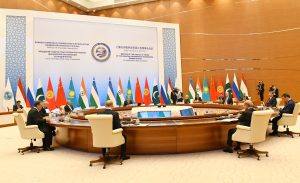As the president of the Shanghai Cooperation Organization (SCO) this year, India is hosting a series of meetings leading up to the top-level summit on July 3-4. The SCO Defense Ministers’ Meeting just concluded while the Foreign Ministers’ Meeting is scheduled to be held on May 4-5. These back-to-back high profile meetings, with the Russian and the Chinese minsters attending, have generated much interest in India.
India perceives its membership in the SCO as a means to increase engagements with the Eurasian region. However, India’s participation in the grouping comes with several limitations.
First, disputes with China and Pakistan leave little room for India to maneuver in this grouping. This was witnessed during the Defense Ministers’ Meeting.
The tension between India and China was evident from their ministers’ exchanges – both non-verbal and verbal. On the sidelines of the Defense Ministers’ Meeting, India held bilateral meetings with China, Russia, Kazakhstan, Tajikistan, Uzbekistan, Kyrgyzstan, Iran and Belarus. Indian Defense Minister Rajnath Singh greeted all of his counterparts, barring Chinese Defense Minister Li Shangfu, with a handshake. But Singh chose not to shake hands with Li and instead greeted him in the Indian way: saying “Namaste” with folded hands. During the bilateral meeting, Singh told Li in no uncertain terms that violation of existing agreements dealing with their disputed border has eroded the entire basis of bilateral relations.
As regards to Pakistan, its Defense Minister Khawaja Asif not only skipped visiting India, but he also did not attend the meeting virtually. Instead, a representative from the Pakistani Prime Minister’s Office, Malik Ahmed Khan, attended the meeting virtually. During the meeting, Singh unequivocally called for eliminating terrorism in all forms and fixing accountability on those aiding or funding such activities. Singh’s remarks were directed toward Pakistan.
The gap between India on one side and China and Pakistan on the other is unlikely to be bridged as the perspectives of the three diverge on strategic and security issues.
Both Russia and China were leading powers in the SCO initially. However Russia’s relative power has faded in the past two decades. This has made the SCO a China dominated platform.
According to Dr. C. Raja Mohan, a senior fellow at the Asia Society Policy Institute, New Delhi’s engagements with the SCO were premised on Russian primacy and Moscow’s support of India’s regional interests. India prefers a strong and independent Russia. But at present Russia is China’s junior partner and is struggling to maintain influence in the region. These developments further limit India’s role in the SCO.
In addition, participation in the SCO does not fit with India’s broader foreign policy. Without being explicit, India’s vision of multilateralism is aimed at countering China’s increasing assertiveness in India’s neighborhood and beyond. For this India has not only accelerated its outreach across the Middle East, Africa, and Southeast Asia but has also strengthened strategic partnerships with Western countries. India was active in reviving and participating in the Quad along with the United States, Japan, and Australia to counter China’s influence.
The SCO, by contrast, is not only a China-dominated forum, but it inherently has an anti-West character. The SCO was formed in 2001 as a counter to the West in general and the United States in particular. Further, Iran is set to join the SCO as a member and Belarus is likely to follow, thereby strengthening the anti-West character of the SCO. This makes India an outlier since the collective standpoint of the SCO will remain anti-West.
Finally, India may not even need the SCO. India enjoys close ties with Russia and the Central Asian countries independent of the group. India has decades-old ties with Russia, and Moscow remains a major arms supplier to New Delhi. Even after the Russia-Ukraine war began, and despite having strong ties with the West, India has resisted taking sides and condemning Russia. New Delhi has delicately balanced its ties with Moscow and the West. India-Russia bilateral relations have remained unaffected while India’s engagements with the West have grown simultaneously over the past one year.
Similarly, India has deepened its ties with Central Asia and has successfully set up institutional mechanisms for engaging with the region. The India-Central Asia Dialogue and India-Central Asia Summit are the prominent platforms of engagement between New Delhi and the Central Asian countries. India also interacts with Central Asia through the meeting between the national security advisers of all the countries and through the India-Central Asia Joint Working Group on Afghanistan.
This implies India’s ties with Russia and Central Asia are developing quite nicely independently of the SCO, and would not be affected irrespective of India’s association with the group.
The SCO is unlikely to add to India’s profile in global politics. Growing polarization between the West on one side and Russia and China on the other could result in India having to make a choice in the future, at least with respect to engagements with the SCO. This leaves India with little gain from the group.

































